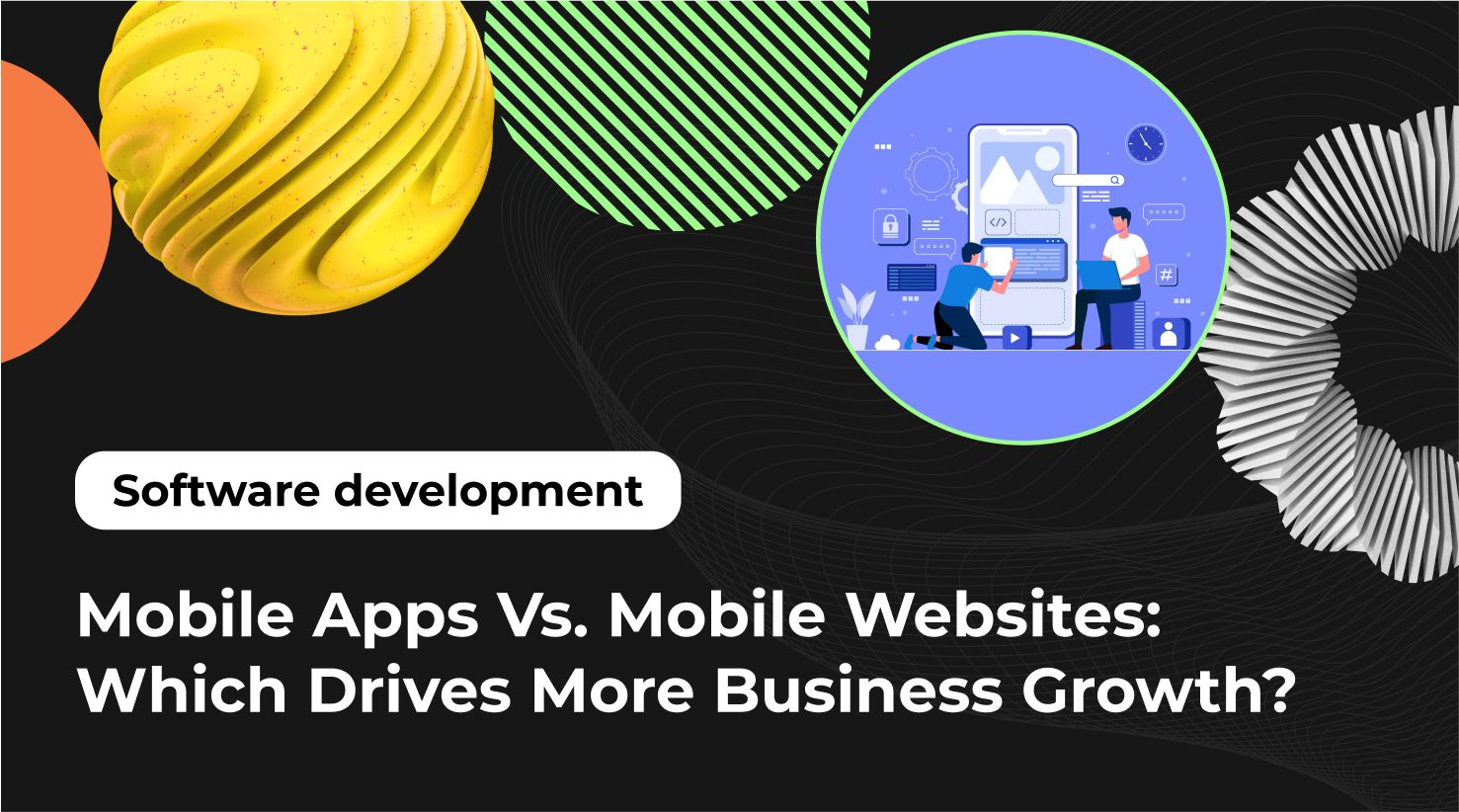In a world where mobile apps and websites compete for users’ attention, companies face an important choice: mobile apps vs. mobile websites. With more than 5.13 billion mobile users worldwide, the choice is of paramount importance. This article will help you understand the ins and outs by comparing the strengths and weaknesses of mobile apps and websites. With 79% of adults keeping their phones within reach 22 hours daily, developing an effective mobile strategy is non-negotiable. Whether you invest in a responsive mobile website or a custom app, understanding the nuances of mobile apps vs. websites is essential for businesses seeking optimal digital engagement.
- The article discusses the choice between mobile apps and websites.
- Mobile apps offer better user experience and engagement but require memory.
- Websites are cost-effective, accessible, and serve different purposes.
What is a mobile website?
A mobile website is an optimized version designed for easy access on mobile devices. It contains the main content from the desktop site, offering a concise yet user-friendly interface. This specialized adaptation is aimed at users who are on the move and prioritizes quick access to vital information. Despite its advantages, such as faster loading times and a personalized experience, the independence of mobile websites from desktop counterparts poses certain challenges. Not all content can be easily transferred to mobile; autonomy requires additional maintenance efforts. In the ongoing debate about mobile apps vs. mobile websites, understanding these nuances is crucial for businesses navigating the digital landscape.
When to use a mobile website
Choosing a mobile website is crucial for a strong online presence. It’s a key step in attracting new customers, showcasing your offerings, and maintaining a professional image for long-term success. The sooner you implement a mobile website, the better – you’ll have access to an ever-growing base of mobile users. Acting as a powerful virtual advertising tool, it gives customers convenient access anytime, anywhere. Ensure your website contains the necessary elements, such as product reviews, recommended products, and contact information, taking into account the online research habits of potential customers. Creating a personalized, cost-effective mobile website is now possible with user-friendly website builder software, empowering businesses in the ongoing discussion about mobile apps vs. mobile websites.
What is a mobile app?
A mobile application is a specialized program on a mobile device designed to perform certain functions, such as the ubiquitous mobile calculator that facilitates calculations. The idea is to adapt computer applications to optimize the user experience on mobile devices. Companies create these applications from scratch using the unique features of the mobile platform. Mobile apps are divided into gaming, productivity, and lifestyle/entertainment apps and serve various needs. Gaming apps dominate consumer spending, while productivity apps optimize tasks such as email management, and lifestyle/entertainment apps cover everything from shopping and dating to social networking and movie watching. In the ongoing debate about mobile apps vs. mobile websites, understanding the specific functionality of mobile apps is paramount.
When to use a mobile app
The timing of creating a mobile app is becoming crucial as mobile devices dominate internet access. The growing market for mobile apps emphasizes their importance. Creating a mobile application allows companies to expand their audience and increase brand awareness by increasing contact with consumers on mobile devices. However, the main focus is on improving the user experience. A well-designed, personalized, and easily accessible app helps to improve reach, communication, engagement, and brand awareness. Loyal customers receive additional benefits, reinforcing mobile apps’ role in creating a seamless and rewarding connection between businesses and their audiences. In the ongoing debate between mobile apps vs. mobile websites, recognizing the unique user-centered benefits of mobile apps is crucial.
Your website is the center of your digital ecosystem, like a brick and mortar location, the experience matters once a customer enters, just as with an actual store.
Chris Osterhout
Benefits of mobile websites for business
For businesses, mobile websites offer a wide audience reach, seamless access, and efficient content delivery. Compared to the complexity of mobile apps vs. websites, mobile websites are cost-effective solutions with universal access.
- Compatibility
Compatibility is a key factor when comparing mobile apps vs. mobile websites. Mobile websites have the distinct advantage of providing seamless access across multiple devices and operating systems. Unlike mobile apps, which are limited to a single platform, websites offer a wider reach without needing separate support teams. This accessibility becomes paramount as users can effortlessly interact with the site without installation-related obstacles. The advantage of mobile websites is their convenience and instant accessibility – a few clicks in the browser and users are already on the site. This ease of access distinguishes them from mobile apps, where users must overcome obstacles in the form of searching, downloading, and installing. Mobile websites are emerging as a universal and user-centered solution in the interoperability debate.
- Updates
Updates play a key role in comparing mobile apps vs. mobile websites. Mobile websites have a clear advantage: the updated version is instantly available to users after being uploaded to the server. In contrast, the process of updating mobile apps is more complex and time-consuming. Each app update is reviewed by Google or Apple before making it available to users, resulting in potential delays of up to two days in the App Store and up to two hours in Google Play. The efficiency of website updates that make changes in real-time underscores the practical advantage in the dynamic mobile content delivery landscape.
- Search Engine Optimization
Search engine optimization (SEO) is critical in the ongoing discussion about mobile apps vs. mobile websites. The main focus is on its role in attracting potential customers and converting them into buyers. Effective SEO ensures that potential customers find your site in search engine results, attracting an audience that is directly interested in your products or services. For mobile apps, visibility largely depends on market rankings. The problem lies in user ratings, which affect search engine rankings and complicate promotion. Effective SEO techniques become a powerful tool for websites, providing a steady stream of interested potential customers and guaranteeing a prominent position in the digital landscape.
- Cost-effectiveness
Cost-effectiveness is a key factor in comparing mobile apps vs. mobile websites. Depending on the chosen development platform, the main problem is hiring separate specialists or teams. Development for both iOS and Android requires hiring separate app developers due to differences in architecture and user experience. This difference significantly increases development costs. In contrast, mobile websites are a more cost-effective solution because they eliminate the need for platform-specific knowledge, allowing businesses to reach a wider audience without the significant costs associated with developing apps for two platforms. In the realm of digital strategy, cost-effectiveness is becoming a compelling factor in determining the choice between mobile apps and websites.
Disadvantages of mobile websites
When thoroughly analyzing mobile apps vs. mobile websites, it is very important to investigate their shortcomings. Unlike mobile apps, mobile websites can face limited functionality and potentially uneven performance, underscoring the importance of developing a digital strategy.
- No offline access
The lack of offline access is a critical drawback when comparing mobile apps vs. mobile websites. Unlike mobile apps, which provide full functionality offline, mobile websites limit users to only pre-cached pages for viewing. Without the ability to send requests to the server, interactivity is compromised, highlighting a significant limitation for users who depend on constant connectivity. In the broader context of digital accessibility, this highlights the significant difference in user experience between mobile apps vs. websites, which impacts the decision-making process for businesses navigating the digital landscape.
- Platform limitations
When choosing between mobile apps vs. mobile websites, consider the significant disadvantage of platform limitations. Mobile websites make less use of the device’s capabilities than mobile apps. Certain hardware features and platform capabilities may not be utilized or work on mobile websites, depending on iOS and Android. iOS limitations include the lack of push notifications, Siri integration, and limited access to certain hardware features. Android limitations include limited access to the calendar and limited telephony features. While mobile websites can access some features through APIs, the inherent differences between the platforms underscore the need for careful consideration when selecting the most appropriate solution to ensure a comprehensive user experience.
- User experience
User experience is a crucial factor in the ongoing debate about mobile apps vs. mobile websites. Mobile apps have the distinct advantage of offering a first-class user experience that is tailored to specific devices, taking into account screen features and size. In contrast, the user experience on mobile websites may not be up to par due to technical limitations associated with browsers as well as limitations inherent in mobile website design. Realizing the paramount importance of user experience is critical for businesses looking to create a smooth and engaging interaction with their audience in the dynamic realm of mobile technology.
Benefits of mobile apps for business
When exploring the dynamics of mobile apps vs. mobile websites, it is important to recognize the obvious advantages of mobile apps for business. They offer a specialized platform, enhanced performance, and interactive features, providing a more engaging and personalized user experience.
- Extensive capabilities
The extensive features set mobile apps apart in the ongoing debate between mobile apps vs. mobile websites. Mobile apps boast many features that surpass the functionality of mobile websites. Mobile apps become a more suitable option if utilizing device-specific features, such as the accelerometer, is crucial. Despite the rapid evolution of the IT industry, traditional mobile apps remain unmatched in providing users with the functionality they desire and ensuring a high level of usability, which underscores their continued relevance in delivering a robust and feature-rich user experience.
- User experience
If we compare mobile apps to mobile websites, user experience is the main advantage of mobile apps. Mobile apps are designed from the outset for specific devices and operating systems and provide easy navigation. This customized approach improves user experience by optimizing the interface’s use of gestures and custom elements. Focusing on device-specific design provides a more intuitive and enjoyable experience for users, underscoring the importance of considering user experience when choosing between mobile apps and websites in a dynamic digital landscape.
- Offline access
Offline access is a significant advantage when comparing mobile apps vs. mobile websites. Mobile apps have the advantage of providing offline access, which is especially important when the product concept requires offline access to certain functions. Unlike mobile websites, which may not perform this function smoothly, mobile apps provide a smoother and more reliable user experience even when users are not connected to the Internet. This emphasis on offline access increases the versatility and usability of mobile apps, making them more attractive and effective in various scenarios.
- Brand promotion opportunities
The opportunities for brand promotion in the mobile app space are growing rapidly compared to mobile websites, with mobile apps being a powerful tool for businesses. Using notifications, businesses can easily remind customers of their brand and communicate vital information, including special offers and discounts.
Companies are successfully using mobile apps to promote their brands. Starbucks, a global coffee chain, uses its mobile app to engage customers through loyalty programs, personalized offers, and convenient mobile ordering. Nike, a well-known sportswear brand, increases brand awareness with a multifunctional app that includes fitness tracking, product customization, and exclusive content. Domino’s Pizza uses a mobile app for convenient online ordering, real-time tracking, and promotional campaigns, strengthening its brand presence in the food delivery industry. These examples demonstrate how companies from different sectors are using mobile apps to connect with their audience, increase loyalty, and improve brand image.
Disadvantages of mobile apps
When researching the dynamics of mobile apps vs. mobile websites, it is important to analyze the disadvantages of mobile apps carefully. Understanding these shortcomings is also crucial for businesses to make informed decisions in the digital environment.
- Cost
Cost plays a significant role in the debate between mobile apps and websites. Mobile app development is a costly process that requires the creation of custom apps for each operating system. Companies often have to develop separate apps for platforms such as Android and iOS to maximize their reach, which requires significant investment. A cost-effective alternative, however, is hybrid or cross-platform solutions that utilize technologies like Flutter. These solutions offer benefits and prove to be more cost effective for businesses, providing a viable trade-off between reaching a broad audience and managing development costs in a competitive mobile environment.
- Maintenance & upgrade
Maintenance and updates are necessary for both mobile apps and websites. Regular updates are crucial to eliminate bugs and implement improvements. While apps require attention for both iOS and Android platforms, websites benefit from simplified maintenance thanks to a single platform. This difference emphasizes the advantage of mobile websites in terms of support efficiency. Despite three weeks of free support to resolve initial bugs, continuous improvement of apps is necessary to stay competitive. Essentially, companies need to recognize that maintaining and upgrading digital products, whether apps or websites, requires significant time and financial resources.
- Long and complicated approvals
Lengthy and complex approval procedures significantly differ between mobile apps and mobile websites. Unlike websites, mobile apps, regardless of platform, go through a complex approval process, which leads to delays and potential problems. On iOS, according to the App Store Review rules, apps are strictly moderated, and the average approval time is about four days. If the requirements are not met, they can be rejected. Android releases, while providing detailed rejection feedback, involve a review process that can take up to 7 days or more. This complex approval path highlights the simplistic nature of website deployment, which is crucial for businesses navigating the digital landscape.
For hire skilled developers
Contact usDifference between app and website
- User experience:
Mobile application: Excellent performance, device-related features, and usability.
Mobile website: Limited by the need to adapt to different devices.
- Customization:
Mobile app: Extensive customization (push notifications, widgets, etc.).
Mobile website: Provides some customization options, but not very extensive.
- Use it offline:
Mobile app: All data can be stored on the device without a connection.
Mobile website: Possible, but the functionality is limited.
- Compatibility:
Mobile app: Different versions for different platforms require a customized approach.
Mobile website: One product with cheaper and easier support for all scenarios.
- Reach:
Mobile app: Limited to the audience associated with the device (tablet or mobile phone).
Mobile website: Available to anyone with internet access, can be distributed.
- Cost:
Mobile application: High development and maintenance costs.
Mobile website: Relatively low development and maintenance costs.
This comparison between a mobile app and a mobile website outlines key criteria to help you decide based on your specific business needs and priorities.
Final Words
So, choosing between mobile apps vs. mobile websites is a key decision for businesses seeking optimal digital engagement. The discussion covers various aspects, including user experience, customization, offline access, compatibility, reach, and cost. While mobile apps offer great opportunities for brand promotion, they come with challenges, such as lengthy approvals and higher costs. On the other hand, mobile websites provide wider access, seamless updates, and cost-effectiveness, albeit with limitations in user experience and offline functionality. Achieving the right balance depends on aligning your business goals with the strengths and weaknesses of each platform.
At Ficus Technologies, we understand all the nuances of the mobile app vs. website debate. Our experience in mobile app development can significantly improve your business. For example, if you want to improve brand awareness and customer engagement, we can create a custom mobile app with features tailored to your industry. Alternatively, if you’re looking for a cost-effective solution with a broader reach, our expertise in building effective mobile websites can be a game-changer.
User engagement depends on the context and goals. Mobile apps often deliver better engagement through personalized experiences, push notifications, and offline access. Apps can leverage device features for immersive interactions, increasing user satisfaction. However, mobile websites offer greater access without installation barriers, making them suitable for reaching a diverse audience. The choice should be based on your business goals. A mobile app may be the best option if frequent interaction, personalized experience, and brand loyalty are priorities. A mobile website is more suitable for a wider reach, cost-effectiveness, and instant access. The decision depends on the specific needs and the desired level of user experience.
The cost-effectiveness of developing a mobile application or creating a mobile website depends on the goals and resources of the business. As a rule, mobile websites are more cost-effective because they offer a universal solution that can be accessed on different devices without developing a specific platform. On the other hand, mobile apps are more costly due to separate development for iOS and Android. However, investing in a mobile app can justify the higher upfront costs if a business is looking to gain specific functionality, improve user experience, and promote a brand. The solution should be aligned with the business goals, target audience, and desired level of interaction and engagement.









This article presents a detailed comparison of business websites and applications. The benefits of having a website include increased reach, lower costs, and easier management. Apps, on the other hand, provide a better user experience, offline access, and push alerts. Nevertheless, the disadvantages of websites include restricted functionality and reliance on internet access, whereas apps may be costly to produce and require frequent upgrades. Finally, the decision is determined by the company’s unique objectives and goals.